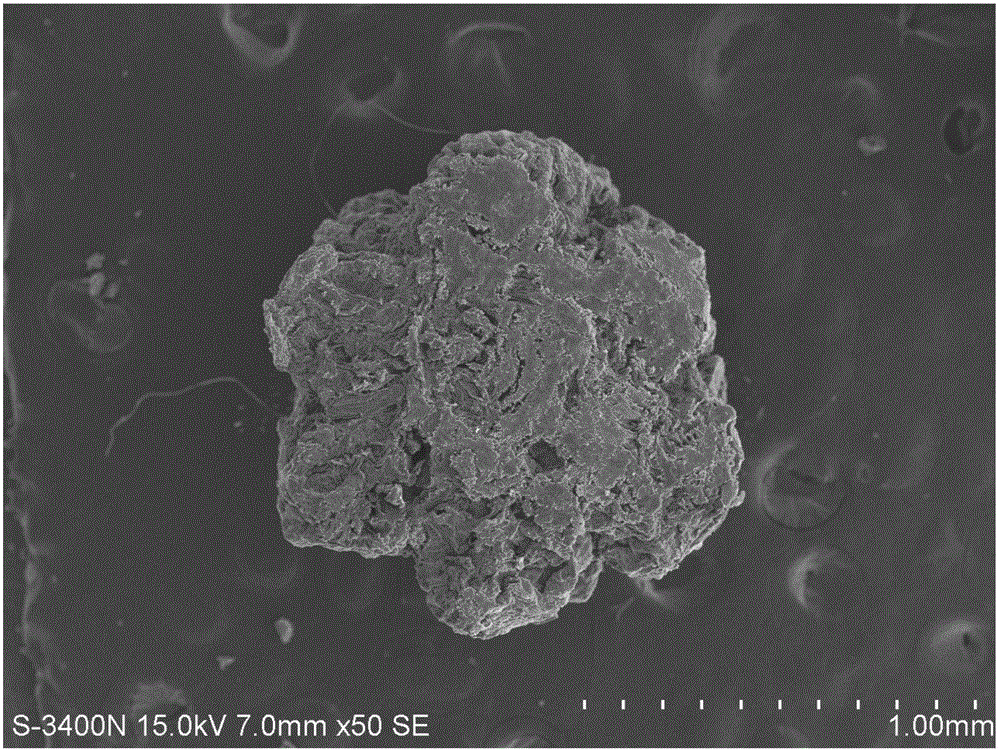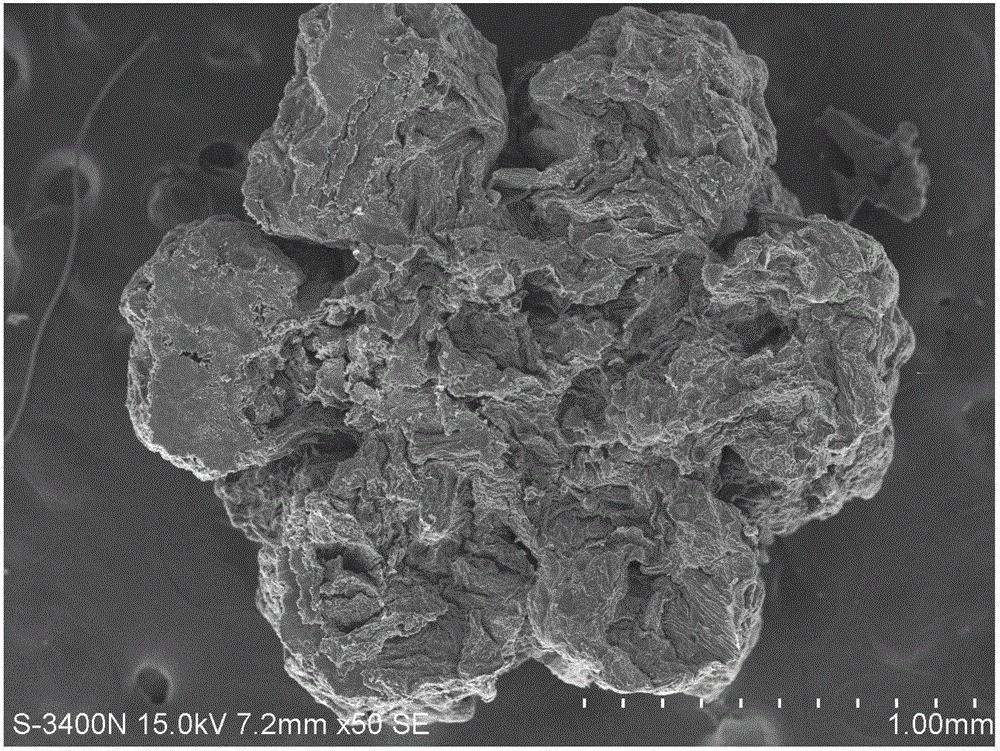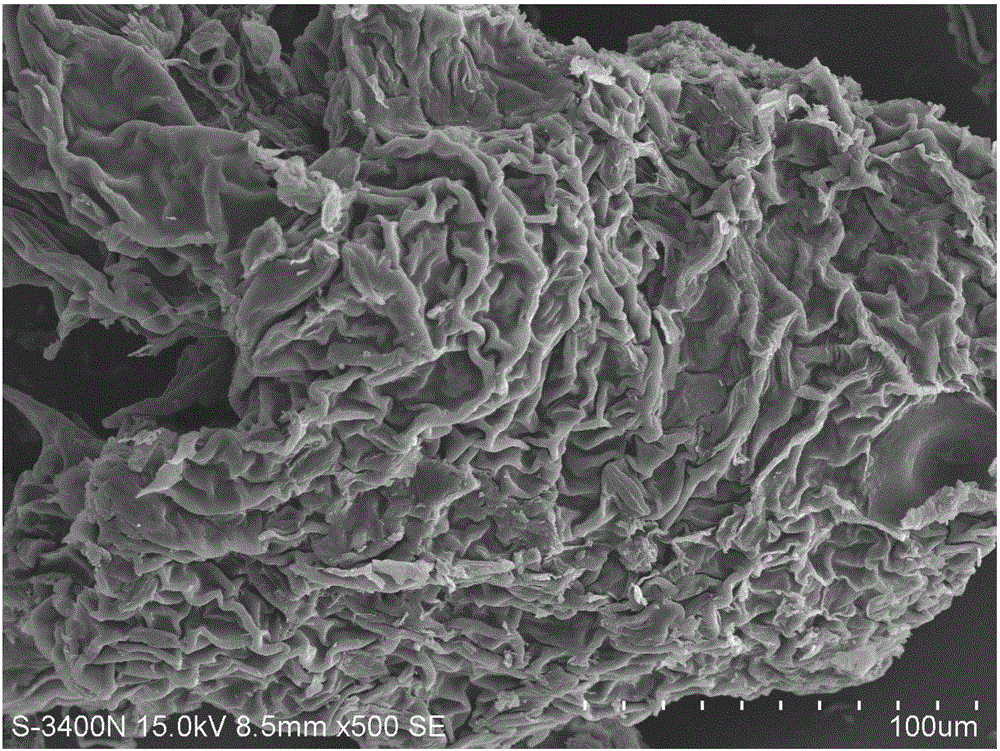Silkworm excrement porous carbon MOFs composite material with high specific surface and preparation method and application thereof
A high specific surface, composite material technology, applied in the field of carbon materials, can solve the problems of excessive pesticide residues in agricultural products, non-target biological damage to the environment, low pesticide utilization efficiency, etc. The effect of porosity
- Summary
- Abstract
- Description
- Claims
- Application Information
AI Technical Summary
Problems solved by technology
Method used
Image
Examples
Embodiment 1
[0040] A preparation method of silkworm excrement porous carbon MOFs composite material with high specific surface area, comprising the following steps,
[0041] (1) The original silkworm excrement and the ZnCl of mass concentration 0.25g / mL 2 The solution was mixed and swollen at 30°C according to the plastid ratio of 1:100 for 3.0h, then the silkworm excrement was fished out, and the silkworm excrement was freeze-dried, first frozen at -20°C for 4h, and then cooled to -60°C for freezing. Dry for 24 hours to obtain freeze-dried silkworm excrement.
[0042] (2) freeze-dried silkworm excrement in N 2 In the atmosphere, the temperature was raised to 300°C at a rate of 5°C / min, and kept at 300°C for 5.0h to carry out the pore expansion reaction. After naturally cooling down to room temperature, the obtained solid was dissolved in 1mol / L HCl to wash and dissolve ZnCl 2 , and then washed with deionized water to pH ≈ 7, then centrifuged, placed in an oven to dry overnight, and obt...
Embodiment 2
[0047] (1) The original silkworm excrement and the ZnCl of mass concentration 0.25g / mL 2 The solution was mixed and swollen at 35°C according to the plastid ratio of 1:120 for 2.5 hours, and then the silkworm excrement was fished out, and the silkworm excrement was freeze-dried. It was first frozen at -20°C for 3 hours, and then cooled to -55°C. Dry for 36 hours to obtain freeze-dried silkworm excrement.
[0048] (2) Raise the freeze-dried silkworm excrement to 350°C at a heating rate of 5°C / min in an Ar atmosphere, and keep it at 350°C for 4.0h to carry out the pore expansion reaction. After naturally cooling down to room temperature, dissolve the obtained solid Wash and dissolve ZnCl in 1mol / L HCl 2 , and then washed with deionized water to pH ≈ 7, then centrifuged, placed in an oven to dry overnight, and obtained the silkworm excrement-based hierarchical porous carbon material after drying.
[0049] (3) Combine the silkworm excrement-based hierarchical porous carbon mater...
Embodiment 3
[0053] (1) The original silkworm excrement and the ZnCl of mass concentration 0.30g / mL 2 The solution was mixed and swollen at 40°C according to the plastid ratio of 1:140 for 2.0h, and then the silkworm excrement was fished out, and the silkworm excrement was freeze-dried, firstly frozen at -25°C for 2h, and then cooled to -50°C for freezing. Dry for 48 hours to obtain freeze-dried silkworm excrement.
[0054] (2) freeze-dried silkworm excrement in N 2 In the atmosphere, the temperature was raised to 400°C at a rate of 5°C / min, and kept at 400°C for 3.0h to carry out the pore expansion reaction. After the natural temperature dropped to room temperature, the obtained solid was dissolved in 1mol / L HCl to wash and dissolve ZnCl 2 , and then washed with deionized water to pH ≈ 7, then centrifuged, placed in an oven to dry overnight, and obtained the silkworm excrement-based hierarchical porous carbon material after drying.
[0055] (3) Combine the silkworm excrement-based hiera...
PUM
| Property | Measurement | Unit |
|---|---|---|
| adsorption capacity | aaaaa | aaaaa |
| porosity | aaaaa | aaaaa |
| Loading capacity | aaaaa | aaaaa |
Abstract
Description
Claims
Application Information
 Login to View More
Login to View More - R&D
- Intellectual Property
- Life Sciences
- Materials
- Tech Scout
- Unparalleled Data Quality
- Higher Quality Content
- 60% Fewer Hallucinations
Browse by: Latest US Patents, China's latest patents, Technical Efficacy Thesaurus, Application Domain, Technology Topic, Popular Technical Reports.
© 2025 PatSnap. All rights reserved.Legal|Privacy policy|Modern Slavery Act Transparency Statement|Sitemap|About US| Contact US: help@patsnap.com



